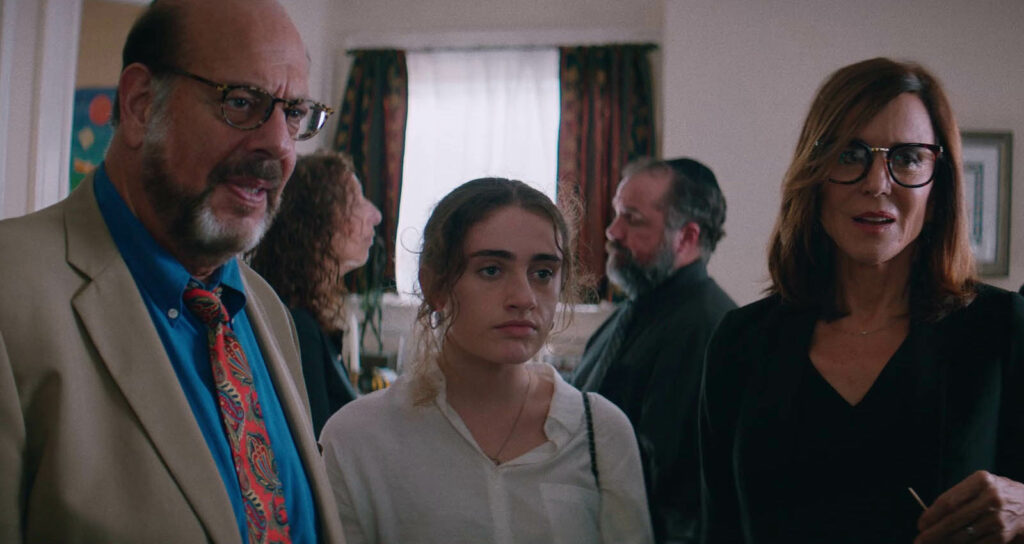Shiva Baby opens to the sounds of an unconvincing orgasm and a semi-enthusiastic “Yeah, daddy!” from Rachel Sennott’s Danielle. A short postcoital interaction has her field questions from her 30-something sugar daddy Max (Danny Deferrari) about her other clients, dance awkwardly around the matter of payment, and stiffly endure an unsettlingly long embrace. This is only a two-minute prologue, and it’s by far the most relaxing part of this masterclass in anxious comedy from first-time feature director Emma Seligman.

Danielle is a bisexual Jewish woman, NYU gender studies student, and part-time sex worker. Presumably, she pursues the latter less out of financial need – her parents pay her bills – than as a means of rebellious empowerment, experimentation, or to stave off boredom. Her parents, Debbie and Joel (Polly Draper and Fred Melamed, a delightful duo) think she babysits while she figures out next steps, while Max believes she needs the money for law school.
The meat of the film happens at the titular shiva – a post-funeral gathering in Jewish tradition – though Danielle is unsure exactly which of her relatives is dead. The moment she walks through the door, an overwhelming claustrophobia sets in. Everyone knows everyone, hands are grabbing at her waist and commenting on her weight loss, reaching to pat her cheek or wipe schmutz off her face, repeating the same questions over an over: does she have a boyfriend? Is she going to graduate school? What are her future plans? What does one do with a gender studies degree? Does she have a job lined up?

Also there is Danielle’s ex-girlfriend and actual law school candidate, Maya (Booksmart’s Molly Gordon), for whom she clearly has unresolved feelings. The next guest to arrive is none other than her sugar daddy, who seems to know Danielle’s father. And just when you thought things couldn’t possibly get any more stressful, in walks Max’s beautiful wife (a pitch-perfect Dianna Agron) and their baby – neither of whom she knew existed. What ensues is a painfully cringey, hilarious, stressful game of whack-a-mole, as Danielle tries to navigate her way around these innumerable obstacles.
Shiva Baby spends much of its sleek 77-minute runtime fraying its audience’s nerves. Ariel Marx’s dissonant score seems lifted straight out of a horror feature, weaving in the oppressive cacophony of gossip and the baby’s screams into what might just be the most stressful opera ever written. In that regard, Shiva Baby shares much with the Safdie brothers’ Uncut Gems; perhaps this begins a canon of heart attack-inducing films with self-sabotaging Jewish protagonists.

Meanwhile, the single location and near real-time frame is choreographed to perfection, tightly wound and made yet more claustrophobic by Maria Rusche’s controlled camerawork. The way the lens moves through the crowd is as fluid, and the air as hot and humid, as it is in Steve McQueen’s acclaimed Lovers Rock – though where the latter delights in dripping sensuality, Shiva Baby is a crescendo of helplessness.
Seligman’s feature climaxes when Danielle succumbs to the overwhelming task of juggling the different versions of herself: her parents’ daughter and an independent adult, who she is in private and in public, her performed self and who she really is. All are in opposition to one another and yet, amidst the ceaseless tension and panic, never does Shiva Baby lose sight of its tender core, the one which exists in that vulnerable limbo between states of being.
Bolstered by phenomenal performances, great effects, and Seligman’s deft handling of its subjects, Shiva Baby is truly unmissable.
Shiva Baby releases digitally on MUBI June 11th.
